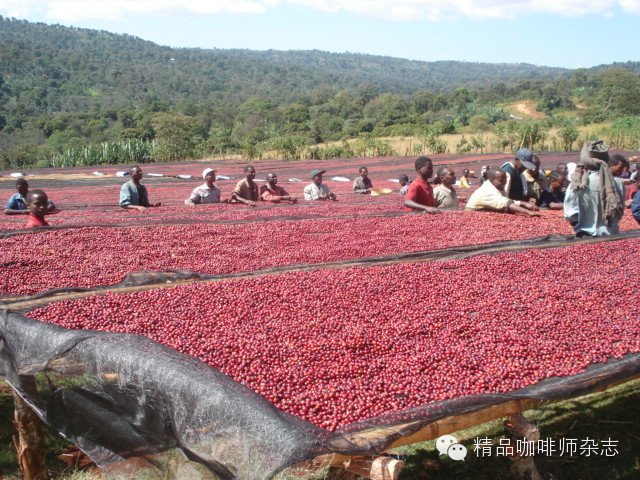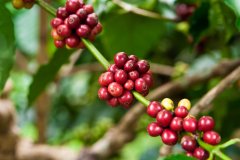Madagascar is basically the producer of Robbins coffee, commercial coffee beans.
The term boutique coffee was first coined by Ms. Knudsen in Coffee and Tea magazine in the United States, when Ms. Knudsen served as B.C. Ireland's coffee buyer in San Francisco, she is very dissatisfied with the industry's neglect of green coffee bean quality, and even some large roasters mix a large number of robersta beans into the mixed beans, so she proposed the concept of fine coffee to advocate the industry to improve quality. The term is used to describe coffee beans that have distinctive flavor characteristics and are grown in special environments. Its use at international coffee conferences spread quickly.
In fact, according to Ms. Knudsen, people started drinking fine coffee, but then as coffee demand continued to grow, new coffee varieties were discovered and used, and the quality of coffee declined. Later, people gradually abandoned this bad and bad coffee and began to switch to other drinks. In this context, Ms Knudsen's re-awakening to the value of fine coffee has led to a fine coffee craze. In the United States, Starbucks has emerged as a representative of the pursuit of boutique coffee enterprises and stores. The market for specialty coffee also continued to grow, becoming one of the fastest-growing markets in the foodservice industry in the 1990s with the proliferation of specialty coffee retailers and cafes, reaching $12.5 billion in the United States alone in 2007. Fine coffee has become the fastest-growing coffee market. Coffee producing and importing countries around the world are aware of the huge potential of the specialty coffee market and continue to make efforts in specialty coffee production and preparation.
Madagascar is basically a producer of Robaik coffee, but there are plans to increase the cultivation of Arabica coffee beans.
Since 1989, the island's coffee industry has been privatized and deregulated, with total coffee production reaching around 1 million bags per year. Domestic consumption of coffee is high because Malagasy people like to drink coffee. The country produces excellent quality Roscoff coffee and France is its main export market.
The Malagasy government plans coffee plantations of approximately 2000 hectares of Robaix coffee and approximately 5000 hectares of Arabica coffee. Therefore, the development of coffee on the island depends on its potential in Arabic coffee, once developed successfully, this coffee is expected to be excellent.

Important Notice :
前街咖啡 FrontStreet Coffee has moved to new addredd:
FrontStreet Coffee Address: 315,Donghua East Road,GuangZhou
Tel:020 38364473
- Prev

Coffee bean production area Wiki Valley
Coffee producing area Editor Coffee beans Coffee beans the most sensible and practical way to understand the countries that produce coffee is to classify them into the three major coffee growing areas in the world: Africa, Indonesia and Central and South America. Generally speaking, coffee grown in the vicinity has similar characteristics. If a particular bean is out of stock, the manufacturer and buyer of the comprehensive product will usually look for the nearby one.
- Next

St. Helena Island is located in the Atlantic boutique coffee island coffee beans.
The term "fine coffee" was first put forward by Ms. Knudsen of the United States in Coffee and Tea magazine. At that time, Ms. Knudsen, as a coffee buyer at B.C. Ireland in San Francisco, was very dissatisfied with the neglect of the quality of raw coffee in the industry, and even some big roasters mixed a large amount of Robesda beans in the comprehensive beans, so she put forward the concept of boutique coffee.
Related
- Does Rose Summer choose Blue, Green or Red? Detailed explanation of Rose Summer Coffee plots and Classification in Panamanian Jade Manor
- What is the difference between the origin, producing area, processing plant, cooperative and manor of coffee beans?
- How fine does the espresso powder fit? how to grind the espresso?
- Sca coffee roasting degree color card coffee roasting degree 8 roasting color values what do you mean?
- The practice of lattes: how to make lattes at home
- Introduction to Indonesian Fine Coffee beans-- Java Coffee producing area of Indonesian Arabica Coffee
- How much will the flavor of light and medium roasted rose summer be expressed? What baking level is rose summer suitable for?
- Introduction to the characteristics of washing, sun-drying or wet-planing coffee commonly used in Mantenin, Indonesia
- Price characteristics of Arabica Coffee Bean Starbucks introduction to Manning Coffee Bean Taste producing area Variety Manor
- What is the authentic Yega flavor? What are the flavor characteristics of the really excellent Yejasuffi coffee beans?

